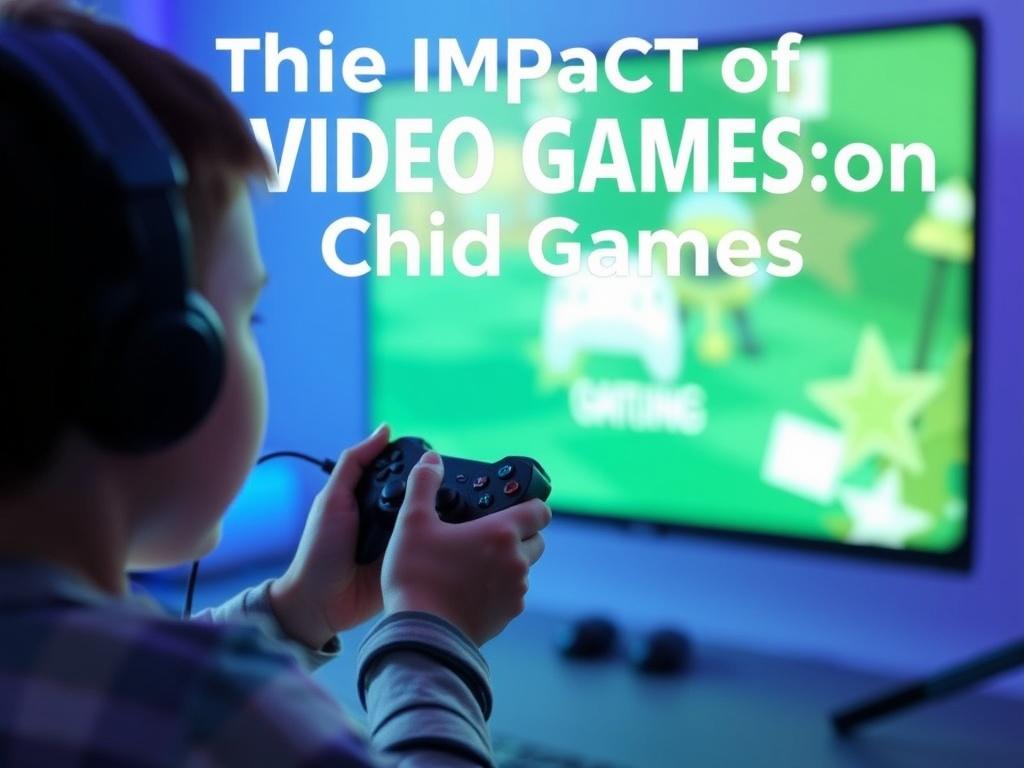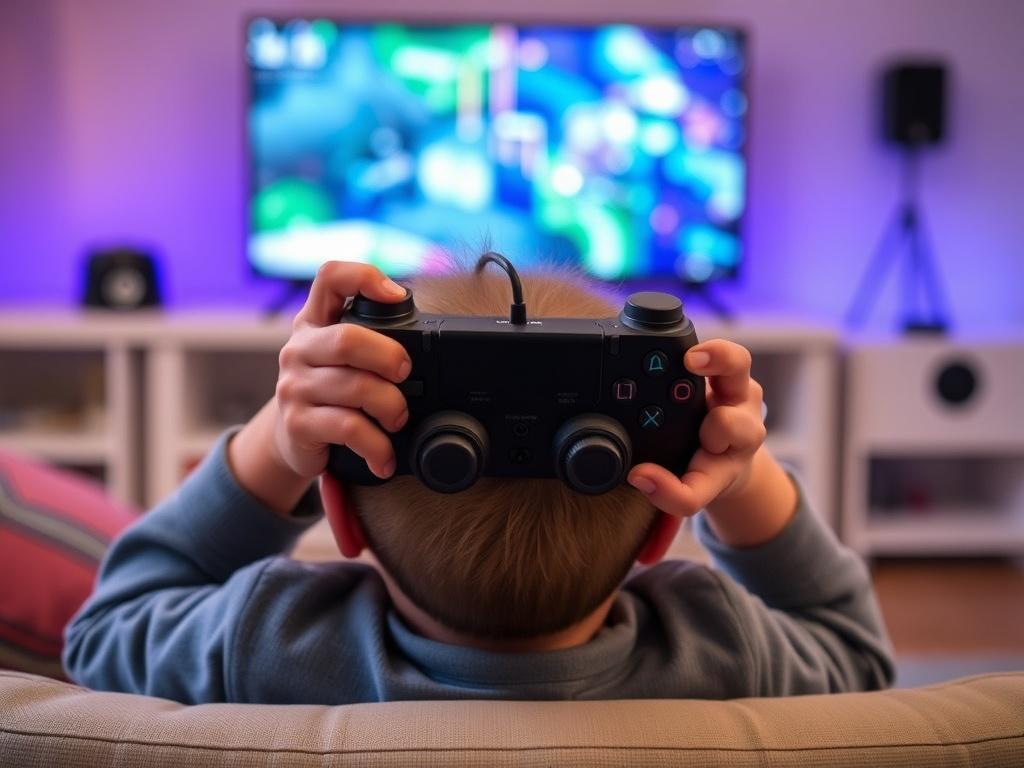SQLITE NOT INSTALLED
In today’s fast-paced digital era, video games have become a ubiquitous part of childhood. Children across the globe spend hours immersed in virtual worlds, navigating challenges, and engaging with complex stories. This phenomenon has sparked a significant amount of interest and concern among parents, educators, and psychologists alike. What exactly is the impact of video games on child behavior? Are they a harmless form of entertainment, or do they carry deeper consequences for emotional, social, and cognitive development?
In this article, we will explore the multifaceted effects of video games on children. We’ll delve into both the positive and negative influences, backed by scientific findings and expert opinions, and provide practical guidance on how to manage video game use effectively. Whether you’re a parent curious about your child’s gaming habits or someone interested in the broader societal implications, this comprehensive exploration will offer valuable insights.
The Increasing Popularity of Video Games Among Children
Video games have evolved from simple pixelated screens to complex, immersive experiences with stunning graphics and intricate storylines. According to recent surveys, it’s estimated that over 90% of children play video games regularly. From console games and PC games to mobile applications and online multiplayer worlds, the range of experiences is vast and continuously growing.
This widespread adoption begs the question: what attracts children to video games, and how does this engagement affect their behavior? To understand this, we must first look at the underlying appeal of video games.
Why Do Children Love Video Games?
Video games offer unique experiences that combine fun, challenge, social connections, and creative expression. The interactive element distinguishes video games from passive media like television. Children are not just watching but actively participating, making decisions that influence the game’s outcome.
Here are some key reasons why video games are appealing:
- Reward Systems: Games often provide frequent rewards, such as points, badges, or new levels, which stimulate the brain’s pleasure centers.
- Social Interaction: Many games encourage teamwork or competition, allowing children to interact with peers globally.
- Challenge and Mastery: Games present problems and obstacles that children work to solve, fostering a sense of accomplishment.
- Creativity and Exploration: Sandbox and open-world games let children explore, build, and express themselves in unique ways.
Understanding these attractions helps us see why video games have become such a dominant form of entertainment and why parents might need to be mindful about their child’s gaming time.
Positive Impacts of Video Games on Child Behavior

It is essential to recognize that video games are not inherently bad. In fact, many studies highlight the positive influences video gaming can have on various aspects of a child’s development.
Cognitive Benefits
Contrary to the belief that video gaming hampers brain function, certain types of games enhance cognitive skills. Puzzle, strategy, and role-playing games encourage problem-solving, strategic planning, and critical thinking.
Children playing these games regularly develop better hand-eye coordination, faster reaction times, and improved spatial reasoning abilities. Research even suggests these cognitive improvements can translate into better performance in school subjects, particularly math and science.
Improved Social Skills
Multiplayer and cooperative games promote teamwork, negotiation, and communication. For children who may struggle with traditional social settings due to shyness or social anxiety, games provide an alternative platform to build connections and friendships.
Furthermore, online gaming communities often foster a sense of belonging and shared interests, contributing to positive social experiences that can enhance self-esteem and interpersonal skills.
Emotional Regulation and Resilience
Video games can also teach children important emotional skills. Handling failure and setbacks during gameplay can promote resilience, patience, and perseverance. Additionally, games often provide an outlet for stress relief and emotional expression, enabling children to manage negative feelings constructively.
Negative Impacts of Video Games on Child Behavior
While there are notable benefits, it’s important to also address potential adverse effects. The impact of video games, especially when played excessively or without supervision, can lead to changes in child behavior that concern parents and professionals alike.
Aggression and Violent Behavior
One of the most contentious topics is the relationship between violent video games and increased aggression in children. Numerous studies have attempted to link exposure to violent content with aggressive thoughts, feelings, and behaviors.
Although the research results remain mixed, it is accepted that prolonged exposure to violent scenarios without proper context can desensitize children and potentially normalize aggression as a problem-solving method. This concern highlights the need for careful selection and monitoring of game content appropriate for children’s age and emotional maturity.
Addiction and Excessive Screen Time
Video game addiction is a growing issue affecting child behavior. Excessive gaming can lead to neglect of other important activities such as schoolwork, physical exercise, and face-to-face socialization.
Excess screen time is also linked with negative outcomes such as:
- Sleep disturbances
- Obesity
- Increased anxiety or depression symptoms
- Difficulty concentrating
Recognizing the signs of problematic gaming early can help families intervene and implement healthier gaming habits.
Impaired Social Development
Despite the social opportunities video games offer, excessive focus on virtual worlds can detract from real-world interactions. Children who spend too much time gaming might develop limited social skills outside their gaming communities and have trouble navigating real-life social nuances.
This is especially important during formative years when social learning is critical. Therefore, balancing screen time with offline social activities remains vital.
How Parents Can Manage the Impact of Video Games on Child Behavior
Parents and caregivers play a crucial role in shaping how video games influence their children’s behavior. Rather than outright banning video games—which might be impractical or counterproductive—guidance and monitoring can turn gaming into a positive experience.
Set Clear Limits and Rules
Establishing boundaries around when and how long children can play video games helps prevent overuse and maintains balance with other life activities.
Recommended Screen Time Limits
| Age Group | Recommended Daily Screen Time |
|---|---|
| 2-5 years | Less than 1 hour, high-quality programming only |
| 6-12 years | 1-2 hours max, balanced with physical activity |
| 13-18 years | Up to 2 hours for recreational use, balanced with responsibilities |
Parents should tailor these guidelines based on their child’s individual needs and circumstances.
Choose Age-Appropriate Games
Video games come with ratings that indicate suitable age groups and content types. Using these ratings along with reading reviews can help parents select games that support healthy child behavior. Avoiding violent or highly competitive games for younger children is advised.
Encourage Social and Physical Activities
Promote alternative activities that foster real-world socialization and physical health. Organize playdates, sports, creative hobbies, and outdoor time to keep children engaged beyond screens. A diverse range of activities supports balanced emotional and behavioral growth.
Engage and Play Together
Taking an interest in your child’s video games—by playing together or discussing game themes—helps parents understand game content and opens lines of communication. This shared experience builds trust and allows for more meaningful conversations about the lessons and emotions games evoke.
Expert Opinions and Scientific Studies on Video Games and Child Behavior
Understanding the true impact of video games on child behavior requires considering diverse expert views and rigorous scientific research. Psychology, neuroscience, and education sectors continue to investigate this complex issue.
Key Findings from Research
| Study | Findings | Implications |
|---|---|---|
| American Psychological Association, 2015 | Some evidence linking violent games with short-term aggression, but no proven long-term effects | Context and parental guidance are critical |
| University of Rochester, 2018 | Action video games improve visual attention and spatial skills | Positive cognitive development possible through gaming |
| World Health Organization, 2019 | Recognized gaming disorder as a mental health condition | Awareness and treatment of gaming addiction are important |
Balancing the Debate
Experts agree that video games themselves are neither entirely good nor bad. Instead, the effects depend on the nature of the games, the amount of time spent, and the support systems surrounding children. Personalized, moderated gaming in a supportive environment can harness benefits while mitigating risks.
Practical Tips for Parents and Educators
To foster a healthy attitude toward video games and reduce negative impacts on child behavior, here are practical recommendations:
- Educate Yourself: Understand the types of games your child enjoys and their content.
- Set a Routine: Include gaming as part of a balanced daily schedule.
- Monitor Behavior: Watch for changes like irritability, withdrawal, or academic decline.
- Promote Open Dialogue: Encourage children to talk about their gaming experiences and feelings.
- Encourage Breaks: Regular pauses prevent fatigue and maintain physical health.
- Lead by Example: Model balanced screen use and prioritize offline interactions.
The Future of Video Games and Child Behavior
As technology continues to advance, video games will become even more immersive with virtual reality, artificial intelligence, and personalized gaming experiences. This evolution demands ongoing research, adaptive parenting strategies, and innovative educational tools.
Emerging trends such as serious games designed for education and therapy show promise for leveraging gaming technology for child development and well-being. Meanwhile, public policy and game industry regulations play vital roles in ensuring safe gaming environments for children.
What To Expect
- More Research: Deeper insights into how various game genres impact child psychology.
- Improved Parental Controls: Sophisticated tools to customize children’s gaming experiences.
- Educational Integration: Games incorporated into school curricula for engagement and learning.
- Balanced Marketplace: Greater emphasis on games supporting healthy social and emotional growth.
Conclusion

The impact of video games on child behavior is a complex landscape of opportunities and challenges. Video games can enhance cognitive skills, offer valuable social experiences, and provide emotional support when enjoyed responsibly. However, risks such as aggression, addiction, and social withdrawal underscore the importance of mindful usage.
Ultimately, the key to harnessing the benefits of video gaming lies in balanced consumption, education, and parental involvement. By embracing video games as one part of a rich tapestry of childhood experiences—and ensuring supportive guidance—parents, educators, and society can nurture healthier, happier children ready to thrive both online and offline.
Thank you for joining this in-depth exploration of video games and child behavior. If you found this article helpful, please share it with others navigating the ever-changing digital world of children’s entertainment.
